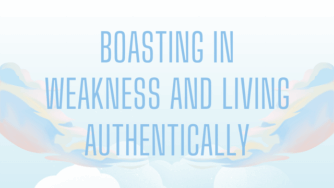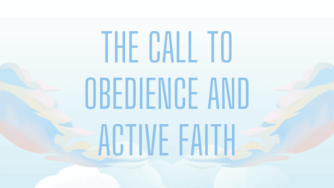Forgiving With Biblical Power
A Divine Reflection How We are to be Forgiving
Forgiving can be a hard thing when someone had hurt us. But the reality is that in our journey through life, we all encounter moments where we must confront the wrongs done to us. Forgiving these wrongs can often seem like an insurmountable task. As humans, we often find ourselves struggling with the idea of forgiveness. We talk about its significance, yet sometimes, we forget the true essence of what it means to forgive. The truth is, forgiveness is not something we can achieve through human effort alone; we need divine assistance.
Last week, we delved into the significance of forgiveness and explored the idea that human hands alone are not capable of true forgiveness. This week, we continue this exploration, understanding that to truly forgive, we need help that surpasses our human capabilities. Proverbs 19:11 offers us a glimpse into how God’s forgiveness works: “Good sense makes one slow to anger, and it is his glory to overlook an offense.”
This verse reveals God’s infinite wisdom and the starting point of forgiveness: love. Forgiveness, according to God, begins with love that manifests through patience. But it doesn’t stop there. To genuinely forgive, we must understand our true identity and accept the forgiveness we’ve received from God. Only then can we reflect this divine forgiveness to others.
On our own, we are incapable of truly forgiving any offense. Forgiveness comes from God alone. He empowers us to forgive, and this empowerment stems from understanding and embracing our true identity in Him. During communion, Tyler reminded us of this new identity, echoing the words of 1 Peter: we are born anew. God has given us a new identity, and with it, the power to forgive as He forgives us.
Embracing Our New Identity
Our new identity in Christ is foundational to our ability to forgive. Without this understanding, we remain trapped in the old ways, unable to let go of the past. This new identity is not just a label; it is a profound transformation that changes how we see ourselves and others.
In accepting God’s forgiveness, we are called to extend the same grace to those who have wronged us. This is not an easy task. It requires a shift in perspective, moving from a place of hurt and resentment to one of love and compassion. This shift is only possible when we fully grasp our new identity in Christ.
Our identity in Christ means we are no longer defined by our past mistakes or the wrongs committed against us. Instead, we are defined by the love and grace of God. This transformation allows us to see others through the lens of God’s love, making forgiveness not just possible but essential.
The Role of Love and Patience in Forgiving
Proverbs 19:11 teaches us that good sense makes one slow to anger and that it is a glory to overlook an offense. This good sense is rooted in love and patience. Love compels us to see beyond the immediate hurt and to consider the bigger picture. Patience allows us to take a step back, to breathe, and to let God’s peace fill our hearts.
In our human nature, we are quick to anger and slow to forgive. But through God’s love and patience, we can become slow to anger and quick to forgive. This transformation is a testament to the power of God’s love working within us.
Patience is a fruit of the Spirit, and it is through the Spirit that we gain the strength to forgive. Patience helps us to bear with one another, to endure the hurts and disappointments that come with relationships, and to extend grace in moments of conflict.
The Reflection of Divine Forgiving
Our forgiveness is a reflection of the forgiveness we’ve received from God. When we forgive others, we are not merely acting out of our own strength or goodness. We are mirroring the divine forgiveness that has been extended to us. This reflection is a powerful testimony to God’s love and grace.
In the same way that a mirror reflects an image, our forgiveness reflects God’s forgiveness. It is a tangible demonstration of His love and mercy at work in our lives. When we forgive, we are not just letting go of a wrong; we are participating in the divine act of grace that God has initiated.
Forgiveness is not just a personal act; it is a divine calling. By forgiving, we become conduits of God’s grace, showing the world what His love looks like in action. This reflection of divine forgiveness is a powerful witness to the transformative power of God’s love.
Practical Steps to Forgiving
Forgiveness is a journey, and like any journey, it requires practical steps. Here are some steps to help you embrace forgiveness:
- Acknowledge the Hurt: Recognize the pain and hurt caused by the offense. Ignoring it will only make it harder to forgive.
- Seek God’s Help: Pray and ask God to give you the strength and willingness to forgive. Remember, forgiveness is a divine act, and we need God’s help to do it.
- Reflect on God’s Forgiveness: Spend time meditating on the forgiveness you have received from God. Let this reflection fill you with gratitude and the desire to extend the same grace to others.
- Let Go of Resentment: Release the anger and resentment you may be holding onto. This is often the hardest step, but it is crucial for true forgiveness.
- Extend Grace: Choose to extend grace to the person who wronged you. This doesn’t mean excusing their behavior, but rather choosing to forgive them despite it.
- Seek Reconciliation: Where possible, seek to reconcile with the person. This may not always be possible, but it is a powerful step towards healing.
Overcoming Obstacles to Forgiving
While the steps to Forgiving may seem straightforward, the reality is often much more complex. Many obstacles can hinder our ability to forgive, including deep-seated anger, pride, and a desire for revenge. Here are some common obstacles and ways to overcome them:
- Anger: Anger is a natural response to being wronged, but it can become a barrier to forgiveness if left unchecked. To overcome anger, practice mindfulness and prayer. Ask God to help you release your anger and fill your heart with peace.
- Pride: Pride can make it difficult to forgive because it often involves admitting that we need help and recognizing our own shortcomings. Humility is key to overcoming pride. Reflect on your own need for forgiveness and let this humble your heart.
- Desire for Revenge: The desire for revenge can be powerful, but it ultimately leads to more pain and suffering. Trust in God’s justice and let go of the need for personal retribution. Remember that God calls us to forgive and leave justice in His hands.
- Fear of Being Hurt Again: Sometimes, we fear that forgiving someone will make us vulnerable to being hurt again. It’s important to set healthy boundaries while still extending forgiveness. Forgiveness does not mean allowing someone to continue hurting us.
- Misunderstanding Forgiveness: Some people believe that forgiving means condoning the behavior or pretending it never happened. Forgiveness is about freeing yourself from the burden of anger and resentment, not excusing the wrongdoing.
The Healing Power of Forgiving
Forgiveness is not only beneficial for our spiritual well-being but also for our emotional and physical health. Studies have shown that forgiveness can lead to lower levels of stress, anxiety, and depression. It can improve our relationships and lead to a greater sense of peace and well-being.
When we hold onto unforgiveness, it can manifest in physical ailments such as high blood pressure, weakened immune systems, and chronic pain. By forgiving, we release the burden of anger and resentment, allowing our bodies to heal and our minds to find peace.
Forgiving as a Community
Forgiveness is not just an individual act; it is also a communal one. As a church community, we are called to support one another in the journey of forgiveness. This involves creating a culture of grace and compassion, where people feel safe to admit their hurts and seek forgiveness.
Encourage open and honest communication within your community. Create spaces where people can share their struggles and support one another in prayer. As a community, model the forgiveness of Christ, showing grace and compassion to one another.
Biblical Examples of Forgiving
The Bible is filled with powerful examples of forgiveness that can inspire and guide us. Joseph, for instance, forgave his brothers who sold him into slavery, recognizing that God had a greater purpose for his suffering. His story, found in Genesis 50:20, reminds us that God can use even the most painful experiences for good.
Jesus, our ultimate example, demonstrated radical forgiveness on the cross when He prayed, “Father, forgive them, for they do not know what they are doing” (Luke 23:34). His willingness to forgive those who crucified Him shows us the depth of God’s love and mercy.
The Apostle Paul also teaches us about forgiveness. In Ephesians 4:32, he writes, “Be kind and compassionate to one another, forgiving each other, just as in Christ God forgave you.” Paul’s words remind us that our ability to forgive is rooted in the forgiveness we have received from Christ.
Forgiving in Everyday Life
Forgiveness is not just for the big, life-altering events; it is also for the everyday grievances and annoyances. Practicing forgiveness in our daily lives helps us to cultivate a heart of grace and compassion. Whether it’s forgiving a coworker for a thoughtless comment or letting go of a minor slight from a friend, these small acts of forgiveness build up our capacity to forgive in more significant ways.
The Long-Term Impact of Forgiving
The long-term impact of forgiveness can be profound. It not only transforms our relationships but also shapes our character. By choosing to forgive, we become more like Christ, embodying His love and grace in our interactions with others. This transformation has a ripple effect, influencing our families, communities, and even society at large.
When we forgive, we break the cycle of bitterness and resentment, paving the way for reconciliation and peace. This impact extends beyond our personal lives, contributing to a culture of forgiveness and grace in our wider community.
Conclusion
Forgiveness is a divine act that requires us to tap into the love and power of God. It begins with understanding our new identity in Christ and reflecting the forgiveness we’ve received from Him. Through love, patience, and the power of the Holy Spirit, we can forgive as God forgives us.
As we journey through life, let us strive to embody this divine forgiveness, bringing healing and restoration to our relationships and reflecting God’s glory to the world. Let us remember that forgiveness is not a one-time event but a continual process of letting go and letting God. May we always seek His help in this journey, trusting in His infinite wisdom and love to guide us.
By embracing forgiveness, we not only free ourselves from the burden of anger and resentment but also participate in the divine act of grace that God has initiated. Let us be a light in the world, showing the power of God’s love through our willingness to forgive. As we do so, we will experience the true freedom and peace that comes from living in the fullness of God’s grace.s remember that forgiveness is not a one-time event but a continual process of letting go and letting God. May we always seek His help in this journey, trusting in His infinite wisdom and love to guide us.





